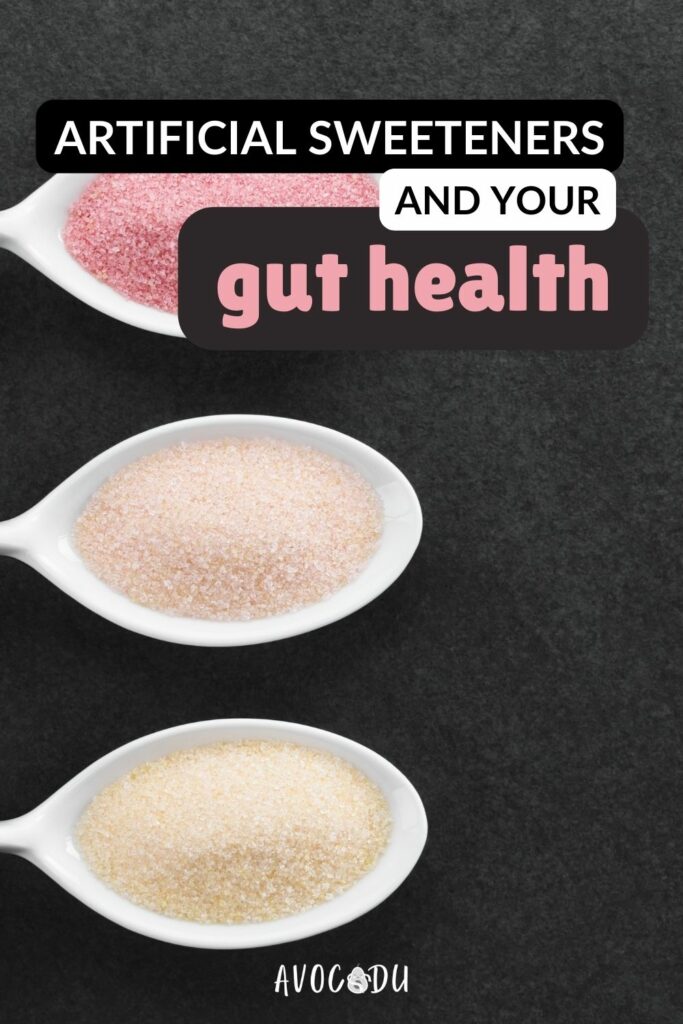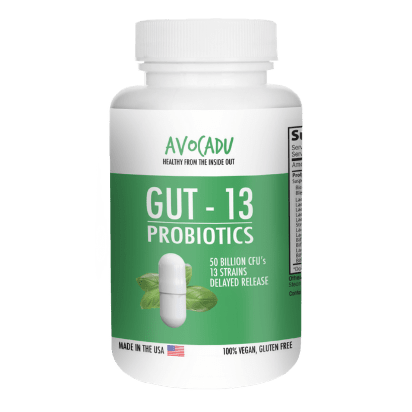Are Artificial Sweeteners Bad for Gut Health?
I grew up drinking Diet Coke. Like, a lot of Diet Coke.
It was my go-to for an afternoon pick-me-up, and I genuinely loved the taste.
But a few years ago, I started noticing something weird: my resting heart rate would spike every time I had one.
I tried cutting out caffeine. I switched to regular sodas. I tested natural sweeteners like Stevia.
Eventually, I figured it out…it was the Aspartame. ?
Now, I avoid Aspartame and other artificial sweeteners completely. I drink Zevia, which is sweetened with Stevia, and I haven’t had issues since.
That experience made me wonder: What do artificial sweeteners actually do to your gut?

This post may contain affiliate links, which helps keep this content free. Please read our disclosure for more info.
What Are Artificial Sweeteners?
Artificial sweeteners are zero- or low-calorie sugar substitutes used to sweeten food and drinks without the added calories of regular sugar. You’ll find them in everything from diet sodas and “sugar-free” protein bars to chewing gum, flavored yogurts, puddings, and even some medications.
They’re designed to trick your taste buds without triggering a rise in blood sugar, but they also come with some trade-offs, especially for your gut.
Common artificial sweeteners include:
- Aspartame (found in Equal, NutraSweet)
- Sucralose (found in Splenda)
- Saccharin (found in Sweet’N Low)
- Acesulfame potassium (often labeled as Ace-K)
These are synthetic, lab-made compounds that can be hundreds of times sweeter than sugar. That’s why just a tiny amount goes a long way.
You’ll also come across sugar alcohols, like:
- Erythritol
- Xylitol
- Sorbitol
These aren’t technically artificial but are often lumped into the same category. They’re common in keto products and low-carb baked goods, but they can cause bloating or digestive upset—especially in larger amounts.
Then there are natural sweeteners, like:
- Stevia
- Monk Fruit
These come from plants and are often marketed as gut-friendly or more natural alternatives. While they’re not perfect for everyone, they tend to be better tolerated than artificial options like Aspartame or Sucralose.
So what’s the difference when it comes to gut health?
That’s where things get interesting—and a little more complicated.
How Artificial Sweeteners Affect Gut Health
Your gut is home to trillions of bacteria, viruses, and fungi—together, they make up your gut microbiome. This tiny ecosystem plays a big role in your overall health. It helps you digest food, absorb nutrients, regulate your immune system, and even influence your mood and metabolism.
When your microbiome is balanced, your body functions more smoothly. But when it’s disrupted, you might feel bloated, sluggish, anxious, or even start craving more sugar.
So where do artificial sweeteners come in?
Research suggests that certain artificial sweeteners can throw off that balance in a few ways:
- Aspartame and Sucralose may reduce bacterial diversity.
A diverse gut microbiome is a healthy one. When sweeteners reduce the variety of beneficial bacteria, it creates space for more harmful strains to grow. - Some sweeteners promote gut inflammation.
Animal studies have shown that artificial sweeteners may trigger inflammatory responses in the digestive tract. This can lead to discomfort, irregular bowel movements, and immune stress. - They may alter how your body processes glucose.
Some sweeteners have been linked to impaired glucose tolerance, which means your body becomes less efficient at processing sugar…ironically, the very thing these sweeteners are supposed to help with. - They can lead to symptoms like bloating, constipation, and cravings.
People often turn to artificial sweeteners to reduce sugar cravings, but they may do the opposite. Gut bacteria can influence what you crave, and when your microbiome is out of whack, those cravings can intensify.
Even though more long-term human studies are still needed, the pattern is clear: artificial sweeteners can negatively affect the gut, especially if your microbiome is already compromised.
Many people with digestive issues report noticeable improvements in symptoms like bloating, gas, and irregularity after removing artificial sweeteners from their diet.
If you suspect your gut is reacting to something, this could be a good place to start looking.
My Personal Experience With Aspartame
For years, I read that Aspartame had been linked to Alzheimer’s disease in some animal studies. And since Alzheimer’s runs in my family, you’d think that would have been enough to convince me to quit drinking Diet Coke.
It wasn’t.
I brushed it off because I didn’t feel any obvious symptoms at the time, and Diet Coke was my favorite drink. It was part of my daily routine and felt harmless enough.
That changed when I started noticing my resting heart rate jump significantly after drinking it. I wasn’t exercising. I wasn’t stressed. I was just sitting at my desk or relaxing, and my heart would race like I’d just finished a workout.
I felt jittery, anxious, and a little panicked. It kept happening, so I started experimenting.
I tested everything.
- Was it the caffeine?
- Was it the carbonation?
- Was it the sugar substitute?
Eventually, I narrowed it down to Aspartame. Other drinks with caffeine didn’t cause a problem. Even real sugar didn’t cause a spike. But every time I had Aspartame, the symptoms returned.
When I finally cut it out completely, the symptoms disappeared.
Now, I stick to Stevia-based sodas like Zevia, and I haven’t had a single episode since. No bloating. No heart racing. No weird side effects.
That experience was a wake-up call. It made me realize that artificial sweeteners can seriously impact my health in a negative way, and it pushed me to take a closer look at what I was putting in my body.
Are Natural Sweeteners Like Stevia Better?
Stevia and Monk Fruit are plant-based sweeteners that come from natural sources, not synthetic chemicals. Stevia is extracted from the leaves of the stevia plant, and monk fruit comes from a small melon native to Southeast Asia. Both are considered safe and are commonly used as sugar alternatives in drinks, snacks, and even baked goods.
Early research suggests that natural sweeteners have a much lower impact on gut bacteria compared to artificial sweeteners like Aspartame and Sucralose. They don’t appear to disrupt the microbiome in the same way and are less likely to trigger inflammation or digestive issues.
That said, they’re not perfect for everyone. Some people still report mild symptoms like bloating or aftertaste sensitivity, especially when used in large amounts or blended with sugar alcohols like erythritol.
But for most people, they’re a better choice.
Personally, I’ve had great results with Stevia.
It satisfies my craving for something sweet without the side effects I experienced from Aspartame. I can still enjoy a soda now and then (thanks to the Zevia brand) without the jittery feeling or racing heart.
It’s been a much easier switch than I expected, and I don’t feel like I’m missing out.
Signs Artificial Sweeteners Might Be Harming Your Gut
Not everyone reacts the same way to artificial sweeteners, but if your gut feels off and you can’t figure out why, these ingredients might be playing a role.
Here are some common signs that artificial sweeteners could be affecting your digestion or overall health:
- Bloating or gas after meals
Especially if you’re eating “sugar-free” products, this can be a sign your gut bacteria aren’t responding well. - Sugar cravings, even when eating “sugar-free” foods
Some sweeteners can confuse your brain and gut, leaving you constantly wanting more. - Constipation or loose stools
An imbalance in gut bacteria can lead to irregular bowel movements. - Brain fog or fatigue
Your gut and brain are closely connected. Disruption in the microbiome may affect how clear-headed and energized you feel. - Unexplained weight changes
Artificial sweeteners can interfere with glucose processing and hunger signals, which may impact your weight over time. - Increased heart rate or anxiety
This was my personal red flag and ultimately what made me investigate further.
If any of these symptoms sound familiar, it might be worth doing a little experiment. Cut out artificial sweeteners for a week and pay attention to how you feel. Sometimes, just removing one thing can lead to noticeable improvements in energy, digestion, and cravings.
What to Use Instead of Artificial Sweeteners
If you’re ready to cut back or eliminate artificial sweeteners, try these options:
- Zevia (stevia-sweetened soda)
- Key Nutrients or LMNT (electrolytes without Aspartame)
- Unsweetened tea with lemon or mint
- Infused water with cucumber or berries
- Protein powders sweetened with Stevia or Monk Fruit
Also, check your labels. Sweeteners like Aspartame and Sucralose often hide in flavored waters, protein bars, chewing gum, and even toothpaste.
Final Thoughts on Gut Health and Sweeteners
Artificial sweeteners may seem harmless, but for many people, they’re not.
If you’re dealing with bloating, sugar cravings, digestive discomfort, or other mystery symptoms, cutting out sweeteners like Aspartame and Sucralose is a great place to start. Even small changes can help your gut feel more balanced and less reactive.
You don’t have to give up sweetness completely—just choose options that actually support your body. Natural alternatives like Stevia and Monk Fruit tend to be much easier on the gut.
And if your gut’s been through it after years of diet drinks and “sugar-free” everything, rebuilding your microbiome is key.
That’s exactly why we created Gut-13 Premium Probiotic here at Avocadu.
PROBIOTIC

Avocadu’s Gut-13 Probiotics
In a recent study, women taking probiotics lost 50% more weight than those who did not. Your gut health and how well you absorb nutrients MATTERS. Don’t miss out on getting in a daily probiotic. Click here.
It’s made with 13 carefully selected strains that are clinically studied to support digestion, reduce bloating, and restore the balance of good bacteria in your gut. No fillers, no junk—just what your body actually needs.
Your gut does a lot for you. Show it some love, and you’ll feel the difference.
